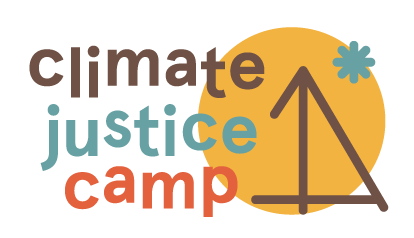The Camp Charter
Welcome to the Climate Justice Camp! This is a place to meet, talk and listen where everyone is legitimate. To make sure that we all feel comfortable, we suggest that you pay attention to the interactions you have with others and try to follow these rules:

- Before speaking, ask yourself how you relate to the discussion
Our race, our gender, our age, our social background and the way our bodies function impact the how society perceives us and the experiences we have had. Before you speak, we suggest that you ask yourself if you are concerned by the discussion: if you are, tell others; and if you are not, leave space for those who are concerned to speak in priority.
- Your choices aren’t the only valid ones
Our paths have given rise to different needs and not all lifestyles are accessible or safe for everyone. For example, it’s easier to tell yourself that you’ll live on very little money if you have a safety net (family, studies…) than if you grew up in a precarious situation. Whatever your choices, don’t judge people who do otherwise.
- Do not silence the words and emotions of others
Some discussions can bring up strong emotions, especially when you are directly affected by the subject of the discussion. Don’t try to calm someone’s anger or other emotions, especially if you are not directly involved in the situation. Keep in mind that Black, racialized and working class people often have their speech cut off because they are too angry.
If you are uncomfortable speaking out as a white, middle- or upper-class person, we suggest that you talk first to people close to you or to the awareness team before asking people to “make an effort” or to speak calmly and pedagogically.
- Explain the specific terms you use
If you use words that are specific to activism or academia, explain what they mean to you. Not all of us are aware of all the terms, all the struggles, or we may put different meanings behind the same word.
- Not everyone likes to be touched
Before you engage in physical contact, such as a hello kiss, ask the other person’s opinion. You may also use a more neutral way to say hello, such as waving your hand.
- Think of how it might impact people around you before consuming substances
If you want to smoke, drink or use other substances, ask if it’s okay with the people around you. There will be specific areas set aside for drinking alcohol and smoking.
Please do not offer alcohol, cigarettes, weed or any other substance to anyone without knowing if they want it – it can be triggering for people who don’t consume it or have stopped to consume it to receive multiple invitations.
- Ask before taking a photo
Some people do not want their picture taken (for safety or other reasons): always ask permission before taking a picture, video or audio recording.
- A person’s gender may not be what you think it is
Some people wear stickers with their pronouns: he, she, they, etc. . For others, you can ask them what their pronouns are before using gendered vocabulary. In all cases, respect the pronouns used by a person.
If you make a mistake, simply correct yourself, and remember that the person does not owe you an explanation of the pronoun they are using. If you’re in a group, it’s easiest to be gender-neutral: there’s no need for ‘Hi guys’; ‘Hi’ works just fine!
- Don’t fetishize black and racialized people
Avoid using exotic words (‘you beautiful mane’ ‘what a lioness!’ ‘you’re a natural’) when talking to Black and racialized people. Do not ask them where they are from based on their skin color and please, please, please don’t try to touch their hair.
- Talk gently
Conversations that take place in a loud, dense space can be tiring for some people such as neuro-divergent people – people who are on the autism spectrum, have Asperger’s Syndrome or attention deficit disorder, etc.
Before you engage in a conversation with a new person, make sure they are willing to participate. Some people are not very comfortable with the famous “Hi, how are you?” because of the automatic “yes” that follows it… Only ask this question if you are open to receiving another type of response.
- Do not infantilize people with disabilities
Talk to the person with a disability about everything that concerns them, even when it’s more complicated or slower. You can offer concrete help, but if it’s not desired, do not insist. Please don’t look at them with a touching look or think that helping them is an act of generosity. Respect everyone’s autonomy: everyone has a place at camp, and it is up to all of us to make it as accessible as possible.
- What to do if you hurt someone’s feelings?
If someone tells you they are hurt by something you did or said, acknowledge their experience and simply apologize. It’s not an attack on your personality, we’re just talking about what you just did or said. Don’t interrupt the person who is hurt to explain your action but concentrate on trying to understand what has offended the other person. If you have been given recommendations and ways to improve your behavior in the future (lucky you!), think about how to implement them.

We suggest that everyone take responsibility for their actions. If you see someone doing something that makes other people uncomfortable, don’t hesitate to talk to them. There will also be a “listening” team that you can call if you feel uncomfortable or unsafe at camp.
Any questions or suggestions? This charter is part of a collective learning process, please come to us to discuss it!
Thanks to les rayonnantes and to lukayo for the inspiration
